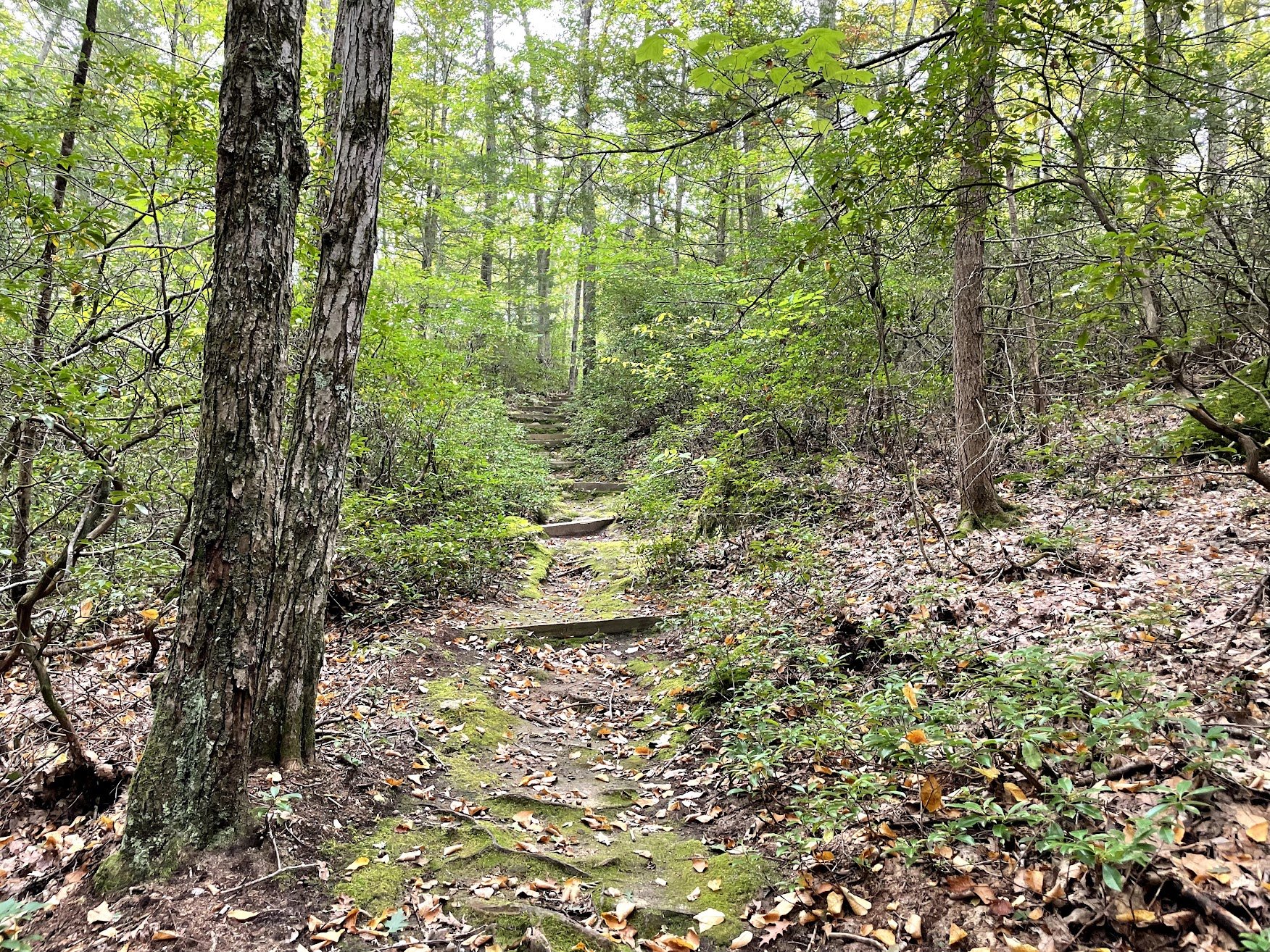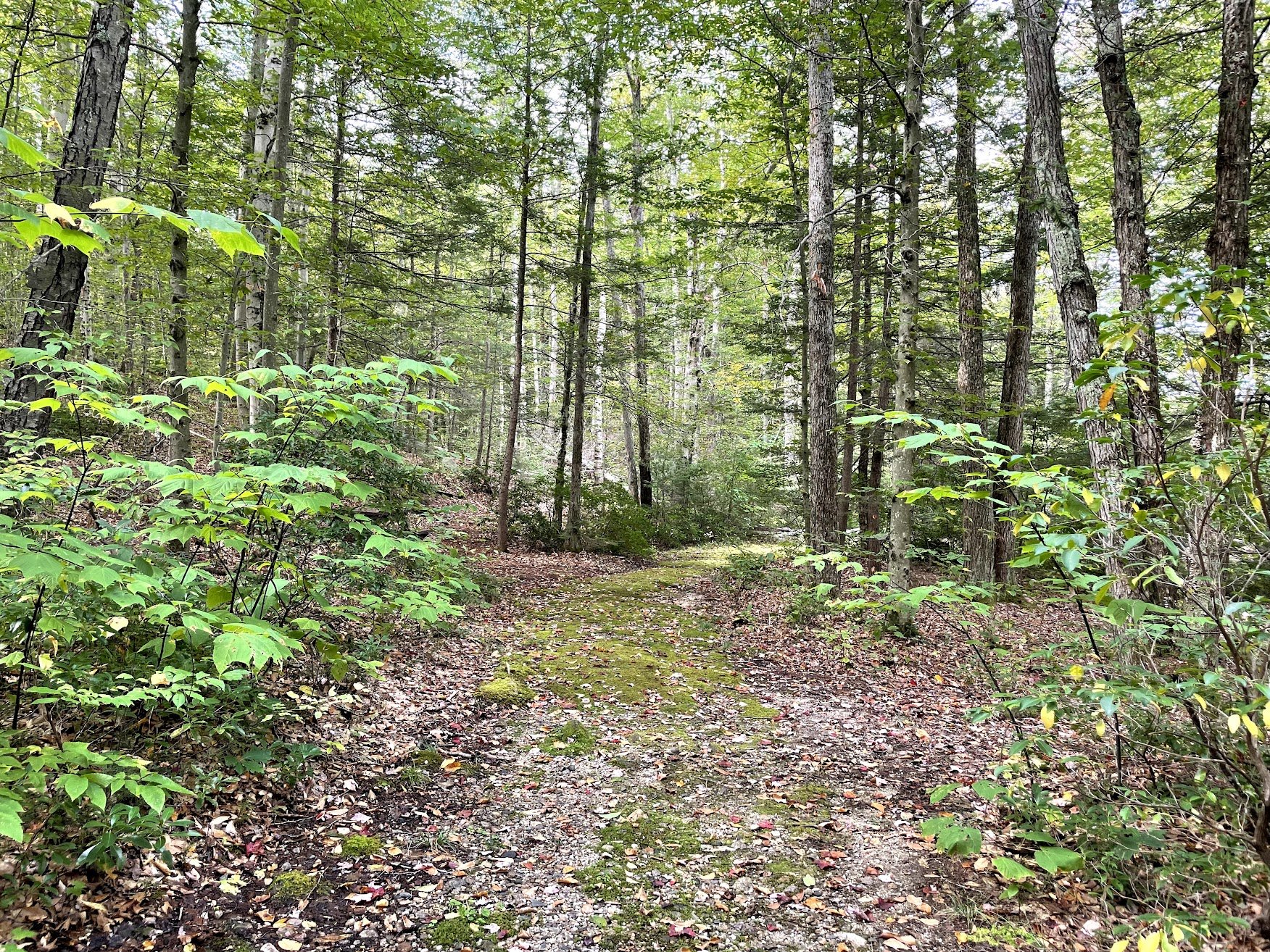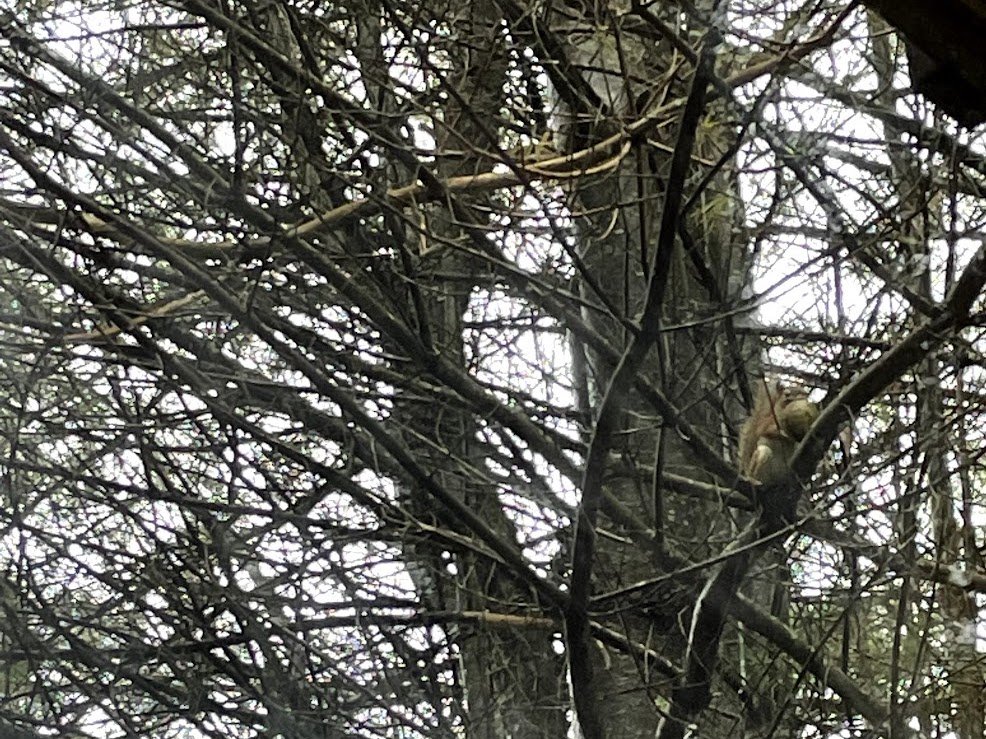In early October 2021, over a year into a global pandemic that upended my little world, I hiked up a narrow trail in Erving State Forest in western Massachusetts. I’d never been these woods before. I was nearly two hours away from home in Boston. The bars on my phone lay flat. No 5G or LTE, only SOS.
Though it was a sunny Sunday, the parking lot had been empty and the park gate unmanned. I’d sauntered along the edge of a scenic pond, resisting the urge to shout a Twilight Zone “Where is everybody?!” Vacant picnic tables sat beneath tall pines. Now I was hiking up into thickly settled woods only because a faded sign had pointed me that way.
On the trail, I stopped to catch my breath and assess where I was headed. I didn’t know. I listened for anyone, anything. Animals. Humans. I was all alone.
Green edging into gold surrounded me on all sides. I stared into the untamed nature and wondered, Why am I here? Why am I the only one here?
If I were to be taken Away, I thought, it would be right now.
~
I was in Erving for a little self-made writing retreat. My favorite retreat spots had permanently closed over the pandemic, so I’d booked a cheap Thoreauvian one-room cabin off AirBnB.
I was revising a novel about an indie filmmaker trying to make it in Hollywood. I’d crammed the manuscript with too many characters who served as my company during quarantine. The draft was a chaotic mess. But finally I’d have time to focus on revisions.
The cabin, I found out upon arrival, was in the backyard of a couple of empty nesters. They were kind and artsy and thrilled to host a writer for a week. The cabin had no WiFi or cell service. After months of working from home and living through my laptop, I felt excited to unplug.
But almost as soon as I settled into the cabin, I found myself in the bed most of the time, curled under the covers. Suddenly it felt like I needed to catch up on years of sleep.
When I did emerge from the bed, I took bites of the the simple sandwiches and granola bars that I’d packed. I brushed my teeth outside, spitting onto soil. I pissed on sawdust in the outhouse. Showered with spiders in the chilly outdoor shower. All this felt self-punishing with the empty nesters’ house standing just meters away.
As the days passed, I kicked myself for feeling so unmotivated and falling behind my writing goals. No retreat before had ever gone like this. Instead of revising, I crocheted granny squares and read for hours. And slept.
I became acquainted with a twitty red squirrel who was hoarding acorns in my cabin roof. I named her Biddy, after Biddy Early, a bean feasa I’d read about in Lady Gregory’s 1920 Visions and Beliefs in the West of Ireland. The book was assigned for a course I was taking Irish supernatural folklore. The class was the only thing sparking my interest those days.
During the nights, I woke up in the pitch dark to the sound of a large animal rustling, brushing its body against the cabin. Each time I imagined a bear breaking in, following the scent of my sandwiches and finding me in bed. I always fell back asleep anyway.
~
Lady Gregory’s Visions and Beliefs in the West of Ireland is a complication of supernatural memorates from the Irish peasantry at the turn of the twentieth century. Each chapter focuses on a certain aspect Irish folklore. Wise Women. Banshees. The Fool of the Forth. Butter superstitions.
The chapter assigned the week I was on retreat was simply titled “Away.” It was the longest chapter. I began reading it outside, under the trees with Biddy with Squirrel chattering above.
Each Away tale, ranging from just a couple sentences to full pages, told of family members, friends, neighbors, and acquaintances all being taken to the faerie Otherworld for days, years, sometimes forever. Though the stories never directly use the term “changeling,” by the fourth or fifth story, it was clear that this was the chapter’s theme.
I thumbed through pages and pages of first-hand accounts about people being taken Away. While the stories varied in circumstance, they were overall unhappy. Folks rarely went away willingly, and the changelings left in their place were often disturbingly strange, ill, or dying.
I became overwhelmed, if not a bit creeped out. These were many stories told by real people about others they knew. What were they saying? How could it be that so many people were Away? There had to be some kernel of truth here.
The changeling tales I’d been familiar with prior had mostly been about babies and young children being swapped with faeries. But here, adult women and men were taken too. Sometimes whole families were Away. No one was safe.
In a few tales, young women were taken shortly after childbirth. It seemed that changelings might’ve been an explanation for what we’d today call postpartum depression. But in many other tales, the correlations were murkier.
“[My son] lies in the bed the most of the day,” says a Man Whose Son is Said to be Away. “And he has a memory for everything he ever heard or read. I never knew the like.”
There were other stories like this—people with extraordinary talents for reading or writing, or for physical strength, but who didn’t fall in line in other ways, either because they were ill, idle, or behaved in a “queer” way.
My creepy feeling transformed into irritation, even indignation, realizing what these changeling tales shared one major thing in common. They were all about pointing out Otherness. Queerness. Possibly even neurodivergence. And in these stories of warning and misfortune, being Away, or an Other, is a bad thing. A sad and scary thing.
Out of the dozens of Away stories, only one storyteller admits to being Away herself as a child, and claims to have no recollection of it. They are always about people who suddenly and radically changed for the worse. Many of the tales end with the Other leaving Ireland altogether for America.
Contemporary changeling stories regularly sit in the horror or thriller genre (down to the recently released Apple TV+ show The Changeling, based on the Victor LaValle novel). A child or a mother may become possessed by a fairy, and it’s up to the protagonist to bring back their loved one, or else grapple with the loss.
Changeling tales are often about how sudden, inexplicable change in a person, particularly a loved one, can be terrifying when witnessed from the outside. In this way, these stories center the value of consistency and conformity and the danger of deviance.
As I finished reading “Away,” I wondered what a tale would look like that centered the changeling’s experience instead. I wanted to hear the perspective of the Others. What was their story?
What is it like to be Away, and to have the people you love look at you like they don’t recognize you—or love you—anymore, because you’ve changed?
As I neared the end of my failed retreat, I decided to blame my lethargy on a lack of exercise. I approached one of the empty nesters’ as she weeded her vast garden. I asked her where I could go for a walk, and she suggested the state forest. It was just up the road.
She asked me how the writing was going. I lied and told her it was going great.
~
If I were to be taken Away, I thought to myself, standing alone in those green-gold woods, it would be right now. No one would even know.
I’d go Away to some unknowable Otherworld and one of Them would take my place, transforming me into someone who could pull me out of this rut that I’ve been stuck in since spring 2020. Come and take me Away!
I was struck with a realization then. A horrible but wonderful revelation. I’m Away already. I’ve been Away for years. That’s why I’m here, alone in the forest with no cell service to begin with.
I laughed into the trees with their changing colors, loud and unhinged, before I turned back around.
When I got back to my cabin, I wrote the initial pages of a new novel—a changeling tale told from the perspective of the changed. It poured out of me easily because it was my story. I would complete the first draft of the novel in just under three months, the fastest I’ve ever written anything of that length.
In my mid-twenties, I went through a period of radical change. I quit my office job with no backup plan. I chopped my hair off, stopped wearing makeup, and started dressing more masculine. I broke up with my boyfriend of seven years, took a new job, and moved away to a coastal town where no one knew me. This all happened within the span of one year.
A lot of the turbulence during that time had to do with not having an explanation for my sudden transformation for my partner, friends, and family. From the outside, this change must’ve been alarming, even hurtful. They were the protagonists in my changeling horror, trying to make sense and bring the Kendra they knew back.
But inside, I was waking up to the fact that I was unhappy and living a life that didn’t feel right to me. For simplicity’s sake, I told everyone I was gay. The truth was more complicated, but I didn’t have the vocabulary yet for a broader queerness. I felt the pressure to explain something I couldn’t totally understand myself.
And while making big changes around my relationships, location, and even my appearance was scary for me too, and often lonely, it was also exciting, freeing, and ultimately for the better.
And yet I have to find a changeling tale that represents personal change in this way—for the better. So, I attempted to write one.
Over the course of revising the novel, I’m not surprised that I found myself grappling with big changes again in my real life.
Right now, two years after the initial story idea came to me in state forest, I’m living in a new town (not too far from Erving, actually). My relationships look different. I look a bit different, too.
Thankfully I don’t feel as much pressure to explain myself this time around. Part of that is getting older. But another part was writing this novel, which reminded me that I always have the right to change. Myself. My mind. My life. I’m allowed to continually transform.
But the past two years have also reminded me how painful, confusing, and heartbreaking change can be. But also how joyful, liberating, and necessary it can be as well.
Sometimes we choose change. Sometimes it just happens to us. Some forms of change are a privilege and require access to resources. Some change can only come from within ourselves. The nuances of change are endless, but I think we can all stand to fear it less and welcome it more.
And if I’m Away with Them already, so be it. I have no plans of coming back.
Biddy the Squirrel as my witness!









